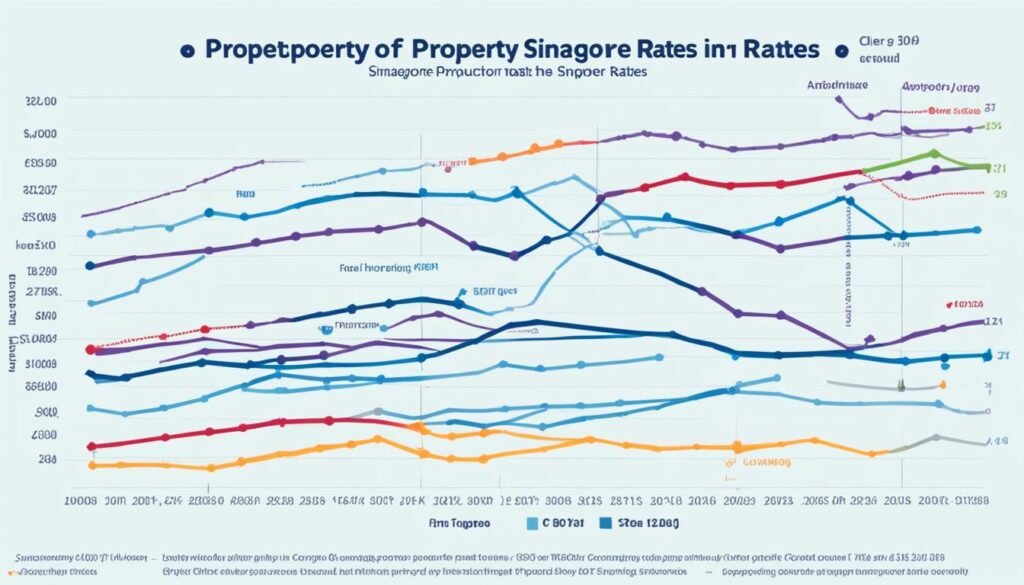Embarking on the journey of financing property in Singapore can be a multifaceted endeavor. With a dynamic real estate market, understanding the nuances of property finance in Singapore is essential for prospective buyers. Whether one is contemplating mortgage loans Singapore or exploring varied real estate financing options, the financial climate remains a key factor in decision-making. For instance, with credit availability tightening post interest rate hikes by the Fed since March 2022, it’s imperative to seek alternative financing methods. Moreover, the burgeoning relevance of private debt sources signifies a pivotal shift in the fabric of finance property in Singapore, carving pathways for investors and homeowners alike.
Key Takeaways
- Comprehend the complexities of financing property in Singapore.
- Stay informed on mortgage loan structures and real estate financing options.
- Recognize the impact of economic trends on property finance.
- Explore alternative financing avenues amid decreased credit availability.
- Assess the stability of real estate investments based on manageable debt levels.
Unlock Financial Opportunities
The Vital Role of Mortgage Loans in Home Ownership
Securing homeowner status in the bustling metropolis of Singapore hinges upon the strategic utilization of mortgage loans Singapore. Reliable funding sources enable aspiring property owners to transform their dreams into tangible realities. In a rapidly urbanizing global landscape, where nearly 60% of the population is expected to inhabit urban centers by 2030, facilitating access to housing is more crucial than ever1. Notably, the sizeable housing finance market mirrors the broader financial sector’s prowess, playing a pivotal role in market deepening processes and addressing the anticipated need for housing and infrastructure by the bulging urban populace1.
Variable vs Fixed Rate Mortgages in Singapore
A closer examination of variable rate mortgages Singapore and fixed rate mortgages Singapore reveals contrasting characteristics pivotal to informed decision-making. While variable rates fluctuate with market trends, offering potential cost-savings during economic troughs, their fixed counterparts provide the security of predictable repayments, guarding against interest volatility. The choice between these mortgage types must be measured against individual financial strategies and market forecasts.
Understanding Lock-In Periods and their Financial Implications
The concept of lock-in periods Singapore stands out as a significant clause within mortgage contracts, dictating the timeframe in which borrowers must adhere to stipulated terms before renegotiating conditions or pivoting to new lenders without incurring penalties. These periods necessitate a thorough comprehension of one’s financial trajectory and the flexibility required to accommodate life’s unpredictable nature.
Real Estate Financing Trends in Singapore’s Property Market
Keeping pace with the ever-evolving real estate financing trends, Singapore’s property market reflects global shifts towards sustainable development. As housing functions contribute substantially to global greenhouse gas emissions in some regions, integral measures are undertaken to curb ecological impacts1. Enhanced collaboration across sectors catalyzes innovation in housing finance, fostering resilient markets and ensuring the integration of lower-income cohorts into the housing narrative1. Harnessing insights from platforms such as the Global Housing Finance team encapsulated in the World Bank’s framework1 is essential in charting a course that aligns with these industry currents.
To gain a deeper understanding of global housing finance and its implications, one should consider the research and initiatives presented by the Global Housing Finance team, which works diligently across various sectors to drive innovation and inclusivity within housing markets1.
Assessing Your Eligibility and Borrowing Capacity
When considering a property purchase in Singapore, understanding your property loan eligibility Singapore and borrowing capacity Singapore is crucial. Lenders evaluate several key factors, including your income and credit history, to determine the mortgage loan requirements you must meet. Below, we delve into the components that influence your credit score, which plays a significant role in your loan eligibility.
Your credit score serves as a financial thumbprint, pivotal in assessing property loan eligibility Singapore. This figure is influenced by various factors, including your payment history, which accounts for 35% of your credit score2, and the amounts you currently owe, contributing another 30%2. The length of your credit history also plays a role, representing 15%2, and the new credit and types of credit in use each make up 10%2. Most lenders utilize the FICO Score 8, which ranges from 300 to 850, with a score of 700 being considered good2. Statistically, around 90% of lenders use FICO Scores to aid in their decision-making process2.
It’s noteworthy that each individual is entitled to one free credit report annually from the three major credit bureaus: Equifax, Experian, and TransUnion2. Regularly reviewing your credit report can provide you with the knowledge necessary to improve your score, thereby improving your borrowing capacity Singapore.
| Credit Score Component | Percentage of Credit Score |
|---|---|
| Payment History | 35% |
| Amounts Owed | 30% |
| Length of Credit History | 15% |
| New Credit | 10% |
| Types of Credit in Use | 10% |
When lenders assess property loan eligibility Singapore, they not only consider your credit profile but also your debt-to-income ratio and overall financial stability. Financial institutions must maintain a robust Liquidity Coverage Ratio (LCR), ensuring they have sufficient high-quality liquid assets to handle potential stress scenarios for a period of 30 days3. This requirement demonstrates a merger of liquidity principles set by the Basel Committee after the 2007 financial crisis3, aiming to safeguard the banking system and, by extension, individual borrowers. With comprehensive knowledge of these prerequisites, you’ll be well-equipped to understand and meet the mortgage loan requirements and pave the way toward purchasing your dream home in Singapore.
Financing Property in Singapore
For prospective homeowners and investors, understanding the diverse mortgage loan options Singapore has to offer is the first step towards making informed decisions in property financing. Whether it’s navigating the intricacies of loan packages or decoding the particulars of interest rates, a strategic approach is critical in procuring the best terms for your financial goals.

Determining the Best Mortgage Packages in Singapore
Among the plethora of mortgage loan options Singapore proffers, each with distinct terms and benefits, one of the clear standout options is the Rental Coverage+ Loan Program, which allows investors to utilize property rental income for an array of financing purposes4. The assurance that comes with property rental income is showcased through leases, rental history, and appraisal, underscoring robust investment security4. Additionally, with brokerage fees from reputable lenders like U.S. Mortgage typically being a one-time completion fee4, investors are reassured of transparent and straightforward transactions.
Navigating Singapore’s Property Loan Landscape
The quest to navigate the navigating property loan landscape involves meticulous scrutiny of various loan programs that proffer advantages such as refinancing options based on a property’s After Repair Value (ARV), beneficial even post-purchase and renovation4. For non-U.S. citizens or expats, Singapore’s loan market offers tailored programs ignoring U.S. credit or residency necessities, a boon for international investors4. An insight into the economic milieu, focusing on regions enriched with average-salaried workers, can be indispensable for investors aiming to maintain a stable tenant pool and minimize vacancies4.
Consulting commercial mortgage specialists can be instrumental in optimizing investments, with specialized programs assisting in NNN Commercial properties acquisitions by offering extensive guidance4. In countries like Singapore, with a significant expatriate population, this is particularly pertinent.
| Loan Program | Interest Rate | Refinancing Option | Loan Tenure |
|---|---|---|---|
| Rental Coverage+ Loan | Custom rates based on value and down payment4 | Yes, using rental income4 | Up to 35 years5 |
| Property Purchase Location | Varies; Direct contact required4 | Yes, based on ARV4 | 10-35 years5 |
| NNN Commercial Property | Guidance through specialists4 | Yes, with additional support4 | N/A |
It’s worth noting that navigating through the best mortgage packages Singapore offers involves understanding the Total Debt Servicing Ratio (TDSR) and Mortgage Servicing Ratio (MSR) – crucial elements used by HDB or banks to determine the loan amount provided to individuals5. Furthermore, with options of fixed interest rates offering stability over a period5 and floating rates influenced by global economic currents5, the property loan landscape in Singapore remains dynamic and adaptable to the borrower’s needs.
Unlock Financial Opportunities
Selecting the Right Financial Institution

When embarking on the journey of financing property in Singapore, one of the most critical decisions is choosing the right bank for mortgage. Among the myriad of financial institutions Singapore boasts, certain factors come into play that could affect the long-term benefits and costs of your investment. A key consideration is whether to engage with agency lenders, recognized for providing multifamily property loans with various term options.
Competent mortgage lenders Singapore market usually propose both fixed-rate and floating-rate loans, with terms extending up to and beyond 10 years. Here lies a significant aspect to deliberate; these agency loans might impose more substantial prepayment penalties compared to standard bank loans. The savvy investor must weigh this potential cost against the stability these loan types offer6.
Moreover, those aiming for flexibility in managing their debt portfolio may find solace in agency-approved lenders, capable of setting up credit facilities for cross-collateralized assets. However, multifamily investors ought to ensure they can adhere to the terms without altering their property, as these credit facilities, while versatile, demand a more time-consuming setup than individual property loans do and may become problematic if changes are necessary before the loan matures6.
Thus, when choosing the right bank for mortgage, consider not just the reputation and fees but also the alignment of the loan features with your financial and operational plans. Pairing multifamily agency loans with bank loans can be a strategic move if conducted with thorough analysis and foresight into your investment’s horizon.
In summation, while financial prowess and favorable interest rates remain paramount in selecting a financial institution, understanding the intricacies of loan structures, like those associated with larger prepayment penalties or the complexities of credit facilities, is equally important. Knowledge is a value in the realm of real estate finance property, and aligning with the right mortgage lender can set the stage for a profitable and harmonious investment journey.
Current Property Financing Rates and What They Mean for Buyers
As prospective homebuyers navigate the complexities of the property market, an understanding of property financing rates Singapore is crucial. These rates, influenced by both personal financial circumstances and broader economic trends and mortgage rates, determine the affordability and suitability of home loans for individual buyers.
In the realm of fixed rate mortgages vs variable rate mortgages, Singapore’s potential homeowners are often caught in a dilemma. Fixed rate mortgages offer the stability of knowing exactly what your payment will be throughout the term of the loan, shielding you from any sudden increase in rates. On the other hand, variable rate mortgages are typically lower than fixed rates initially but can fluctuate with market conditions, offering the possibility of savings if rates decline but risk if they increase.

Fixed vs Variable Rates: A Comparison for Potential Homeowners
Fixed rate mortgages provide the security of consistent payments, which is particularly favorable when economic trends and mortgage rates are expected to rise. Those who prefer predictable budgeting and long-term planning often find solace in this option. Variable rate mortgages can be more attractive during periods of falling interest rates, offering the chance for interest savings over time.
The choice between these mortgage types should be informed by personal risk tolerance and an assessment of the economic environment. Pre-approval letters, indicating the approved loan amount, are valid for 60 to 90 days unless there is a change in the financial situation or loan programs4. Given that interest rates vary based on property value and downpayment, direct contact with lenders is advised for personalized information4.
How Current Economic Trends Affect Mortgage Rates
Living in a dynamic economic landscape, potential homeowners should consider how economic trends and mortgage rates affect their financing options. Broker fees, commonly a one-time payment upon loan completion, and loan program fees, averaging about 2% of the loan amount, contribute to the overall cost of obtaining a mortgage and are typically standard across the industry4.
Rental income, which can be assessed through lease agreements, rental history, or rental appraisal, plays a vital role in financing decisions for investment properties4. Furthermore, refinancing options are crucial to understand, as they offer an opportunity to renegotiate the terms based on the property’s After Repair Value—valuable even after purchase and renovations4.
For international buyers, like many Singaporeans seeking opportunities beyond their shores, it’s worth noting that the U.S. allows property purchases by non-citizens and offers Special loan programs for Foreign Nationals or U.S. Expats, excluding the need for a U.S. green card or citizenship4. These loan programs also cater to individuals without U.S. credit or residency requirements, expanding accessibility for global investors4.
Interested in exploring overseas property investment? Discover how Singaporean couples are achieving financial freedom through U.S. real estate investment in this insightful case study: Singapore’s Journey to Financial Freedom in U.S. Real Estate Investing.
Property Investment Loans in Singapore
Exploring residential real estate financing in Singapore reveals a dynamic market, where possibilities hinge on discerning reliable financing options for property investment. Investors keen on leveraging these options must consider various factors, including loan-to-value ratios and interest rates, which in other countries could imply higher costs for foreign buyers who might face up to 50% down payment requirements and interest rates elevated above those offered to locals7.

Real estate investment financing extends beyond borders, as exemplified by the U.K. and Singapore’s prevalence of leasehold properties, where investors procure ownership of the structure but not the land—a practice that effectively demarcates the span of property control7. This financing intricacy juxtaposes markedly with the Philippines, where foreigners, despite being restricted from land ownership, can still savor property ownership through condominium acquisitions, granted a majority of units are Filipino-owned7.
When deliberating on the financing options for property investment, prospective investors should scrutinize legal frameworks, notably those akin to Mexico’s restrictions on foreign land ownership proximate to borders and coasts, necessitating fideicomisos—a type of trust—or Mexican corporations for property investment outside residential domains7.
| Country | Property Ownership by Foreigners | Notable Financing Conditions |
|---|---|---|
| Philippines | Condominium units allowed | Majority of units must be Filipino-owned7 |
| Canada | Reverse mortgages available | Up to 55% home value, age limit of 557 |
| China | Land use rights for ~70 years | Ownership of property, not land7 |
| Mexico | Restricted within 100km of border/50km of coast | Fideicomisos or non-residential corporations required7 |
Prospective investors in Singapore should heed these international comparisons as a siren’s call to judiciously navigate the seas of residential real estate financing. Whether it’s analyzing leaseholds, understanding foreign ownership limitations, or considering unique financing vehicles like reverse mortgages with eligibility requirements—as in Canada with its age restriction—the savvy investor harnesses global insights to fortify their strategy7.
Armored with this knowledge, one can maneuver through the intricate landscape of property investment loans Singapore, sculpting a path that aligns with long-term investment objectives and regional regulatory landscapes7.
Benefits of Utilizing DBS MyHome Planning Tool
Embarking on the home-buying journey in Singapore can be overwhelming, especially when confronted with the rapidly evolving property market. But with the DBS MyHome Planning Tool, prospective homeowners gain access to one of the most intuitive property planning tools Singapore has to offer. Considering the significant increases in private home prices, which surged by 10.6% in 20218, the DBS MyHome Planning Tool is more relevant than ever, offering users key insights required for making informed decisions.
The HDB resale market has also experienced marked changes, with prices climbing by 12.7% and the number of units selling for at least $1 million rising significantly8. These statistics, paired with the recent adjustment of the loan-to-value ratio from 85% to 80% for HDB home loans8, underscore the importance of having precise, up-to-date financial information at your fingertips—a hallmark benefit of using property planning tools like DBS MyHome.
Furthermore, the benefits of using property planning tools extend to navigating the complex terrain of Additional Buyer’s Stamp Duty (ABSD), where rates have risen, affecting both Singapore citizens and foreign entities8. DBS MyHome Planning Tool simplifies this complexity by seamlessly providing tailored calculations, allowing users to estimate potential stamp duties based on their unique purchasing scenarios.
Facing the prospect of incremental increases in fixed interest rate mortgages, anticipated to rise by 0.75% in 20228, financial clarity becomes critical. The DBS MyHome Planning Tool delivers insights into how such increases might impact monthly repayments—a tool invaluable for those weighing the benefits of securing a fixed interest rate versus a variable rate in an uncertain economic climate.
Finally, understanding down payment requirements, which vary between HDB loans and bank loans8, can dictate the trajectory of a property purchase. The DBS MyHome Planning Tool can help users explore various scenarios, with the added benefit of integrating real-time data to present a comprehensive overview of borrowing and purchasing power.
Amidst these statistical realities, the DBS MyHome Planning Tool stands out as more than just a calculator—it’s an indispensable ally in the journey towards homeownership, underlining the multitude of benefits that come from leveraging sophisticated property planning tools Singapore residents have at their disposal.
Conclusion
Embarking on the journey of residential real estate financing in Singapore encompasses much more than simply securing mortgage loans; it necessitates a profound grasp of the evolving property financing rates and the comprehensive landscape of real estate financing. With the Singapore Property Rental Price Index showing a decrease of 2.9% QoQ, it signals a potential shift in the market dynamics, indicating a critical period for financial planning and decision-making9. This unprecedented downturn in the rental sector since 2018 should be a consideration for investors gauging the market’s stability9.
Fiscal prudence becomes paramount when it comes to the financial responsibilities associated with purchasing property. For instance, foreigners face a higher entry barrier with the additional buyer’s stamp duty (ABSD) starting at 20% on their first residential property, in contrast to Singapore Citizens and Permanent Residents who are privy to a significantly lower ABSD rate of 0% to 5%9. Furthermore, individuals aiming for a swift turnover on their property investments must be acutely conscious of the Seller’s Stamp Duty (SSD), where differential rates might escalate costs, particularly for foreign investors9.
As we consider the nuances of real estate financing, the softened demand and augmented supply reflected by the completion of more condos and BTO flats can act as an influential parameter for potential buyers9. The robust comprehension of these facets allows individuals to approach property investments with comprehensive insight and precision, enabling a strategic and confident ingress into one of Asia’s most dynamic property markets.
Unlock Financial Opportunities
FAQ
What role do mortgage loans play in home ownership in Singapore?
What are the differences between variable and fixed rate mortgages in Singapore?
What are lock-in periods and how do they affect mortgage loans in Singapore?
What are the current real estate financing trends in Singapore's property market?
What are the eligibility requirements and borrowing capacity for obtaining a property loan in Singapore?
How can I determine the best mortgage packages in Singapore?
How can I navigate the complex property loan market in Singapore?
What factors should I consider when selecting a financial institution for a mortgage loan?
How do fixed and variable rates compare, and how do economic trends affect mortgage rates in Singapore?
What financing options are available for property investment in Singapore?
What are the benefits of utilizing the DBS MyHome Planning Tool for property financing in Singapore?
Source Links
- https://www.worldbank.org/en/topic/financialsector/brief/housing-finance
- https://www.investopedia.com/articles/pf/10/credit-score-factors.asp
- https://www.bis.org/publ/bcbs238.pdf
- https://www.americamortgages.com/qa-singapore-couples-journey-to-financial-freedom-through-u-s-real-estate-investing/
- https://www.moneysmart.sg/home-loan/guide-ms
- https://www.jpmorgan.com/insights/real-estate/agency-lending/pairing-multifamily-agency-loans-and-bank-loans
- https://www.investopedia.com/articles/personal-finance/050815/how-finance-foreign-real-estate.asp
- https://www.dbs.com.sg/personal/articles/nav/my-home/buying-a-home-is-getting-expensive
- https://www.accreditloan.com/is-it-worth-buying-a-house-in-singapore-exploring-the-pros-and-cons/

Comments